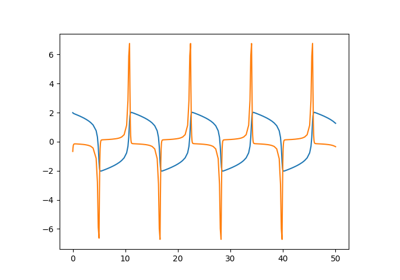ode_problem module¶
Ordinary differential equation problem.
- class gemseo.algos.ode.ode_problem.ODEProblem(func, initial_state, initial_time, final_time, jac=None, jac_desvar=None, adjoint_wrt_state=None, adjoint_wrt_desvar=None, time_vector=None)[source]
Bases:
BaseProblemFirst-order ordinary differential equation (ODE).
A first-order ODE is written as
\[\frac{ds(t)}{dt} = f(t, s(t)).\]where \(f\) is called the right-hand side (RHS) of the ODE and \(s(t)\) is the state vector at time \(t\).
- Parameters:
func (Callable[[float, NumberArray], NumberArray]) – The RHS function \(f\). It will be called as func(time, state) as necessary.
initial_state (ArrayLike) – The initial state of the ODE.
initial_time (float) – The start of the integration interval.
final_time (float) – The end of the integration interval.
jac (Callable[[float, NumberArray], NumberArray] | NumberArray | None) – The function to compute the Jacobian of \(f\). If
Callable, the Jacobian is assumed to be dependent on time and state. It will be called asjac(time, state)as necessary. IfNumberArray, the Jacobian is assumed to be constant. IfNone, the Jacobian will be approximated by finite differences.jac_desvar (Callable[[float, NumberArray], NumberArray] | None) – The function to compute the Jacobian of \(f\) relative to the design variables. If
None, use a solver that doesn’t require the adjoint.adjoint_wrt_state (NumberArray | None) – The adjoint relative to the state. If
None, use a solver that doesn’t require the adjoint.adjoint_wrt_desvar (NumberArray | None) – The adjoint relative to the design variables. If
None, use a solver that doesn’t require the adjoint.time_vector (NumberArray | None) – The time vector for the solution. If
None, the solver will select times for which the computed solution is stored.
- check()[source]
Ensure the parameters of the problem are consistent.
- Raises:
ValueError – If the state and time shapes are inconsistent.
- Return type:
None
- check_jacobian(state_vector, approximation_mode=ApproximationMode.FINITE_DIFFERENCES, step=1e-06, error_max=1e-08)[source]
Check if the Jacobian function is correct.
At a given state, compare the value of the Jacobian computed by the function provided by ther user to an approximated value computed by finite-differences for example.
- Parameters:
state_vector (ArrayLike) – The state at which the Jacobian is checked.
approximation_mode (ApproximationMode) –
The approximation mode.
By default it is set to “finite_differences”.
step (float) –
The step used to approximate the gradients.
By default it is set to 1e-06.
error_max (float) –
The error threshold above which the Jacobian is deemed to be incorrect.
By default it is set to 1e-08.
- Raises:
ValueError – When the Jacobian function is wrong.
- Return type:
None
- adjoint_wrt_desvar: NumberArray
The adjoint of the problem relative to the design variables.
- adjoint_wrt_state: NumberArray
The adjoint of the problem relative to the state.
- initial_state: NumberArray
The initial conditions \((t_0,s_0)\) of the ODE.
- jac: Callable[[float, NumberArray], NumberArray] | NumberArray | None
The function to compute the Jacobian of \(f\).
If
Callable, the Jacobian is assumed to be dependent on time and state. It will be called asjac(time, state)as necessary. IfNumberArray, the Jacobian is assumed to be constant. IfNone, the Jacobian will be approximated by finite differences.
- jac_desvar: Callable[[float, NumberArray], NumberArray]
The function to compute the Jacobian of \(f\) relative to the design variables.
- result: ODEResult
The result of the ODE problem.
- rhs_function: Callable[[float, NumberArray], NumberArray]
The function \(f\).
- property time_vector
The times at which the solution shall be evaluated.

